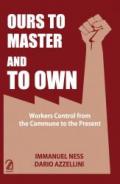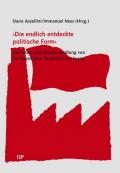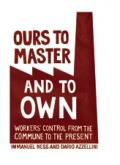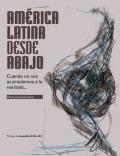Räte
Audiomitschnitt der Veranstaltung vom 15.5.2024, 41 min.
Azzellini und IDA: Rätedemokratie und Arbeitszeitrechnung

Audiomitschnitt Azzellini und IDA (Initiative Demokratische Arbeitszeitrechnung)
Am 15.5.2024 hatten wir Dario Azzellini in Berlin zu Gast und haben mit ihm über Rätedemokratie und Arbeitszeitrechnung gesprochen. Wir teilen mit euch hier den Audiomitschnitt der Veranstaltung.
41 min.
Berlin, May 2024
Notes from an event with Dario Azzellini and the Initiative for Democratic Labour Time Accounting

We document these notes from a recent discussion event. We appreciate that the international discussion about transition is widening and becoming more concrete. When it comes to the recuperated factories in Argentina it would be good to sharpen the political criteria. Which factories are still engaged in a wider political movement for a general social transformation and why?
Räte, Arbeiterkontrolle und Selbstverwaltung am Arbeitsplatz
Wir können auch anders
Die Forderung nach Wirtschaftsdemokratie war eine Initiative der Arbeiter- und Gewerkschaftsbewegung in den 1920er Jahren. In der Bundesrepublik wurde dieser Impuls vor allem in die unterschiedlichen Formen der Mitbestimmung in der verarbeitenden Industrie umgesetzt. Daneben gibt es die Praktiken der Genossenschaften, der Kooperativen und der Selbstverwaltung.
Workers Control From the Commune to the Present
Ours To Master and To Own
From the dawning of the industrial epoch, wage earners have organized themselves into unions, fought bitter strikes, and gone so far as to challenge the very premises of the sytem by creating institutions of democratic self-management aimed at controlling production without bosses. With specific examples drawn from every corner of the globe and every period of modern history, this pathbreaking volume comprehensively traces this often underappreciated historical tradition.
Venezuela. Il controllo operaio
Nei primi anni della presidenza Chávez, quella del controllo operaio era un’idea
sostenuta solo da un piccolo gruppi di lavoratori e dallo stesso Presidente, che di quando in quando si dichiarava a suo favore. Le nazionalizzazioni nel settore industriale sono iniziate solo nel 2005, e in un primo momento sono state una risposta alle occupazioni di fabbriche e alle manifestazioni dei lavoratori e delle lavoratrici.
Rezension von Dario Azzellini
Ralf Hoffrogge: Richard Müller. Der Mann hinter der Novemberrevolution.
"Der heute weitgehend unbekannte Richard Müller war Leiter der Revolutionären Obleute und politisch „zwischen 1916 und 1921 eine der einflussreichsten Persönlichkeiten der Arbeiterbewegung“ (S. 216) in Deutschland. Die Revolutionären Obleute waren eine der Gruppen, die zu den Organisatoren der Massenstreiks 1916–1918 gehörten, und die einzige Organisation, die gegen den Krieg arbeitete und über eine Verankerung in den Betrieben verfügte.
Und sie waren die zentrale Stütze der Novemberrevolution 1918.
[Richard Müller: Der Mann hinter der Novemberrevolution]
Richard Müller: The Man behind the November Revolution
Richard Müller. The Man behind the November Revolution is the title of the
seventh volume of the hardcover book series History of Communism and Leftist
Socialism, edited by Berlin-based Dietz publishers. But who was Richard
Müller? Never heard of him? Today widely unknown, Müller was the leader of
the so-called Revolutionary Shop Stewards in the early twentieth century in
Germany. “From 1916 to 1921, Müller was without any doubt among the
politically most influential personalities in the German labor movement” (216).
Fabrikräte und Selbstverwaltung von der russischen Revolution bis heute - Erschienen am 4. Dezember 2012!
Die endlich entdeckte politische Form
Workers’ Control from the Commune to the Present
Ours to master and to own
From the dawning of the industrial epoch, wage earners have organized themselves into unions, fought bitter strikes, and have gone so far as to challenge the very premises of the system by creating institutions of democratic self-management aimed at controlling production without bosses. Looking at specific examples drawn from every corner of the globe and every period of modern history, this pathbreaking volume comprehensively traces this often under-appreciated historical tradition.




























